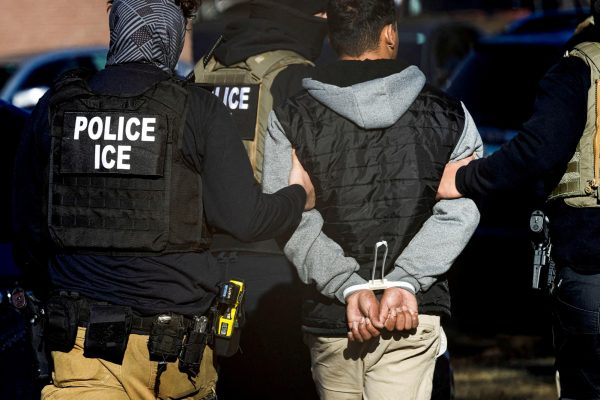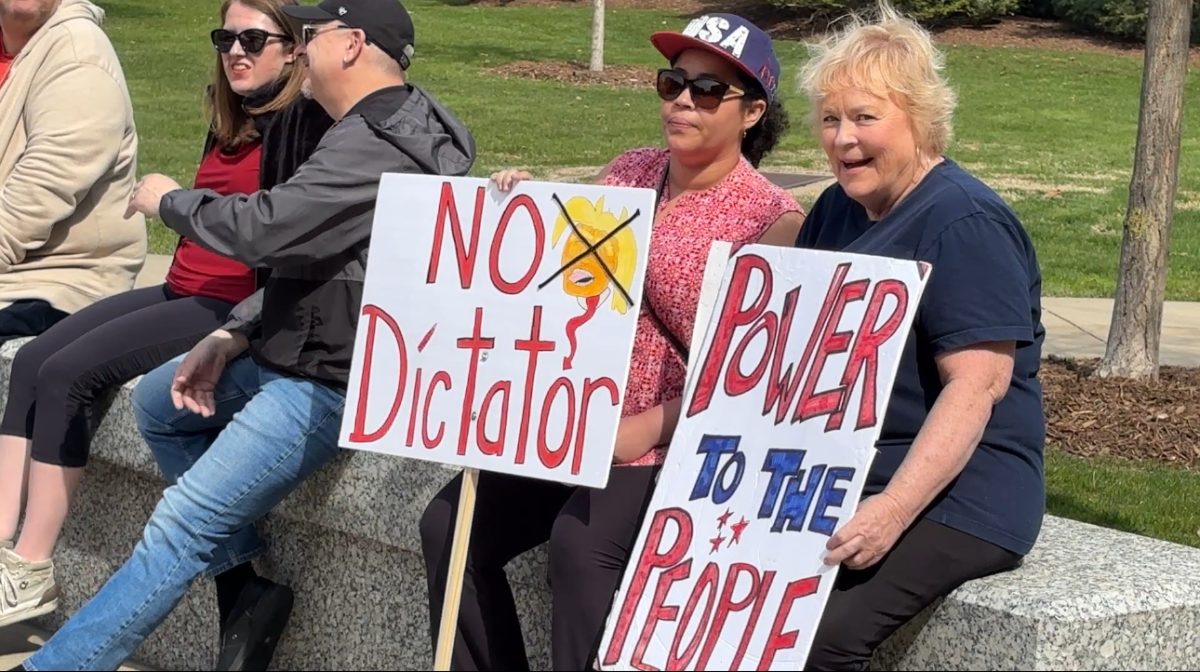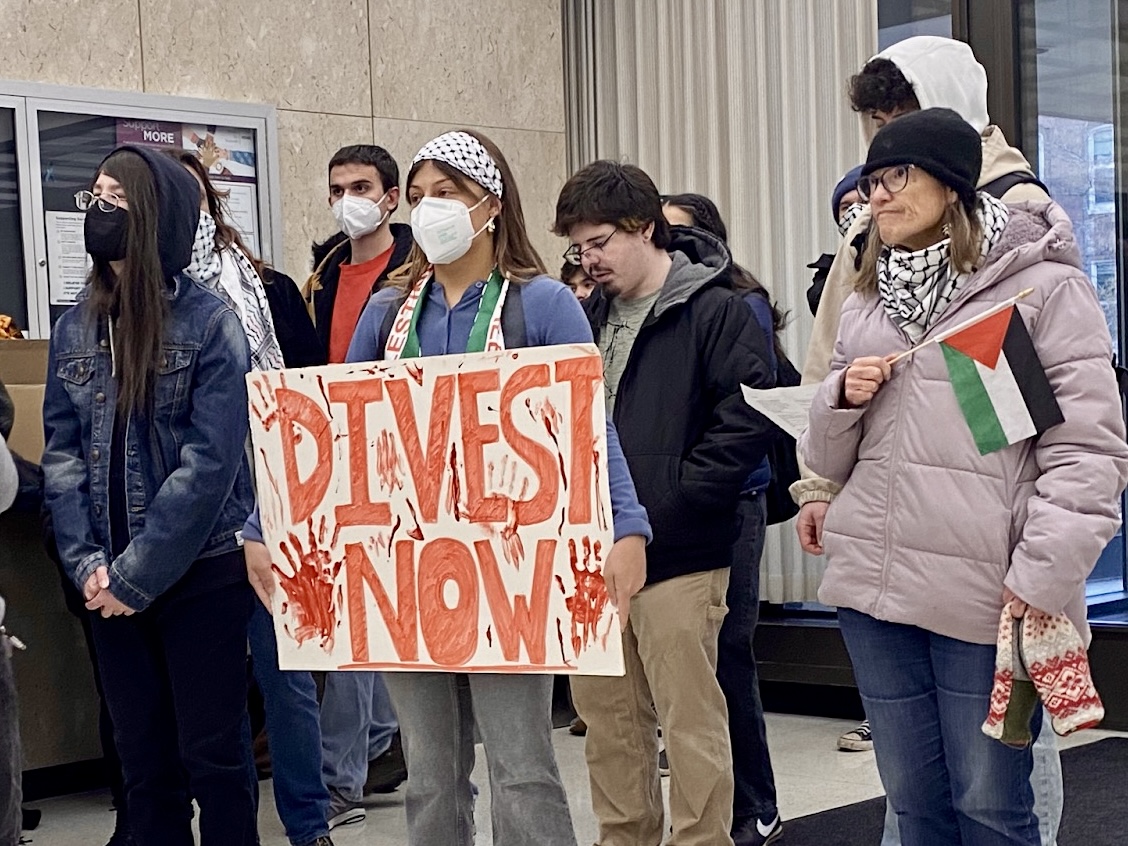New policies ignite anxiety and confusion within the immigrant community at Michigan State University, regardless of students’ immigration status. Law-abiding students fear for the upholding of protective laws and for their lives in the wake of new policies being enforced by the Trump administration, which aim to uproot the immigration system itself.
Among the most concerning policies for students nationwide is the rescission of the sensitive locations memo. Sensitive locations, such as schools, hospitals and churches, have historically been off-limits for U.S. Immigration and Customs Enforcement (ICE). With the lifting of this rule, ICE may access these places.
In turn, there’s a lot of anxiety that students could be stopped by law enforcement on campus. Tomás Tello, a Junior at MSU majoring in supply chain management, explained that the police have stopped some of his friends.

“Some people are saying that you should just keep your passport with you at all times, so it’s just constant fear,” Tello said. “I’ve heard of instances where agents have come here on campus to different buildings, like the library, to try and get information.”
MSU Public Safety Chief, Mike Yankowski, told News 10 on Jan. 31 that the university will not help ICE agents unless they have a valid criminal warrant from the court.
Rather than focusing on their education, students are left in a state of uncertainty – wondering if ICE might show up at school or if their community might be targeted, leading to frequent absences or inattentiveness in class. Samantha Magdaleno, Juris Doctor candidate at MSU and president of the Latinos Unidos Law Student Association (LULSA), expressed her main concern that this is the first administration that she feels terrified of people in her community being targeted and killed.
“When I started organizing back in the day, we always did ‘undocumented unafraid unapologetic,’ and we did a lot of like out of the shadows events where people would come out and they would say, ‘look, you know, I’m undocumented, but I’m here and I’m contributing and I’m not going anywhere,’” Magdaleno said. “And now it’s quite different. Everybody is hiding their status. Nobody wants to talk about it. Our advocacy work has to be done very carefully… it’s terrifying because it seems like the laws just don’t matter anymore.”
According to several of Michigan’s immigration advocacy groups, the recent policy changes have caused dips in attendance at some schools, with some students requesting a virtual option. In response to the removal of the sensitive locations policy, the ACLU of Michigan and the Michigan Immigrant Rights Center (MIRC) sent a letter to all Michigan school districts detailing students’ rights and how they can be protected.
“I feel guilty constantly when I’m in class because I’ll, you know, I’ll log into Facebook and I’ll see like, oh, there’s an ICE raid going on,” Magdaleno said. “And I’m like man, I should be there right now, I should be doing something and helping families out, but I’m sitting in a classroom.”
Since taking office on Jan. 20, President Trump has signed numerous executive orders that target the immigration system itself as well as millions of undocumented immigrants and migrants who reside in the U.S. Some actions were felt immediately, while others are being challenged in court. The administration has rolled out a series of policies, including: ending birthright citizenship, securing the borders, increasing ICE arrest quotas, suspending refugee programs and ending the sensitive locations memo. While other long-standing policies have remained, such as the Priority Enforcement Program, which prioritizes undocumented criminals for deportation.
Much of the wording behind new immigration policies spark concerns that groups of people will be targeted or demonized, and in turn has had a chilling effect on people, now afraid to access medical care, education, childcare and places of worship in fear that they or a loved one will be taken away from the community. Some very strong words are used to describe immigrants in various government documents, such as thugs, thieves, rapists, druggies, gang members, smugglers and human traffickers.
Marty Jordan, an assistant professor in the Department of Political Science at MSU, felt deeply frustrated by the language used.
“Of course, there are individuals who have immigrant identity and who do not have documentation, who have participated in that,” Jordan said. “But using such language communicates the message that a sizable proportion or percentage of individuals from this identity are committing illicit activities or engaged in illicit activities. This is not the case.”
Painting immigrants in this light can negatively affect the rate at which crimes are reported in neighborhoods across the U.S.
“Let’s say an immigrant is targeted and attacked by someone,” Jordan said. “Maybe they’re robbed, maybe they’re sexually assaulted. Given their immigration status, they may be less likely to come forward and report that. That’s bad for all of us. That makes all of us less safe.”
Research has repeatedly shown that immigrant communities and immigrant individuals have a lower incarceration rate than native-born populations. Not only does welcoming immigrants into American communities not increase crime, but it can strengthen public safety, according to the American Immigration Council.
There’s also a common assumption by some Americans that there is a smooth, streamlined process to becoming a documented citizen.
“What I hear time and time again, is that individuals should just get in line,” Jordan said, “If they got in line and followed the proper processes, then they can become residents with status and then transition to citizens. There is no line to get into. There’s no way to transition your status seamlessly from being undocumented to having documentation. There aren’t enough resources, and even if there were, there’s not a legal process for the most part, for most people to adjust their status, right? So, not enough attorneys, not enough support, but also just no real mechanism by which most people could be helped,” Jordan said.
Many immigrants lack the resources to pay an attorney, and pro bono organizations that take cases for free, such as The Michigan Immigrant Rights Center, can only take a fixed number of cases.
“My hunch is that citizens, naturalized citizens, will be caught up in this process and that they may be detained at some point or another,” Jordan said. “It’s critical that all people know their rights, regardless of your immigration status, you have constitutional rights in the United States.”
Even though some students have temporary authorization to be in the U.S., they’re still afraid that at any given point, it could be taken away.
“I’ve known a lot of students that come here on a student visa,” Magdaleno said. “And because somebody in immigration messed up checking a box, they become undocumented in this country, even though they came here the right way. And it’s very, very hard to get back.”
According to America’s Voice Education Fund website, “There are millions of immigrants who have lived in the U.S. for decades, who have worked hard and paid taxes and bought homes, who have U.S.-citizen children, who make valuable community contributions — who have been deported, and forcibly separated from their whole lives in America, because they weren’t able to ‘get legal.’ Many of them have spent years and tens of thousands or more in legal fees trying to find pathways to legalization and citizenship for themselves.”
There has been a longstanding belief among some Americans that those who have committed crimes may not be given their constitutional right of due process. In 2018, President Trump tweeted that undocumented immigrants should be immediately returned “from where they came,” with “no Judges or Court Cases.”
The Fifth Amendment states that “no person [ … ] shall be compelled in any criminal case to be a witness against himself, nor be deprived of life, liberty, or property, without due process of law.” This applies to anyone who is physically on U.S. soil, the only exception being those who are processed through expedited removal. This removal without a court hearing only applies to immigrants who have been in the country illegally for less than two years and are captured within a hundred miles of the border.
Jordan talked about a recent executive order that allows detention without due process for the crime of shoplifting.
“Now, the accusation of shoplifting – it may seem small to most Americans,” Jordan said. “But, you know, you can imagine that if you’re a dad walking through a department store and your kid picks up a pack of gum, right, and walks out with it and the alarm goes off, and the police come, you can imagine how a simple misunderstanding could get you wrapped up into the sort of immigration enforcement net that the Trump administration is casting.”
The Laken-Riley Act, which was passed on Jan. 29, requires the Department of Homeland Security (DHS) to detain certain non-U.S. nationals who have been arrested for burglary, theft, larceny or shoplifting without a court procedure.
“Importantly, both parties, both Democrats and Republicans, have been complicit in not talking about or addressing the root causes of why people immigrate,” Jordan said. “A lot of the challenges that the countries have where immigrants are coming from are because of our failed foreign policies in the region.”
People immigrate to the U.S. for various reasons, referred to as push and pull factors. Push factors, such as political corruption, conflict, disasters, lack of job opportunities and gender inequality can push migrants to leave their home country. While factors such as greater security, better work opportunities and access to adequate healthcare and education can pull or attract them to the U.S.
“They want to stay in their homeland. They only leave because it’s so dangerous. There are few opportunities,” Jordan continued. “There are few ways to move up the economic ladder in their countries because of the policies that either we have contributed to or encouraged their governments to adopt.”
Jordan explained that he lived in El Salvador working with impoverished communities and witnessed this push-and-pull effect firsthand.
“For many decades, people would flee El Salvador because of the poverty, because of the inequality, because of the violence,” Jordan said. “But all of those factors were a direct result of the failed foreign policy of the US in the 1970s and 1980s.”
Members of the community can help support immigrants and push back against new policies by contacting government officials, donating to grassroots organizations, educating themselves, volunteering and being aware of misinformation. Jordan says immigrants and allies alike should first empower themselves through knowledge.
“Educate yourself about immigration, immigration policies in the US, that you help dispel myths around immigration and try to educate others about past policies and present policies,” Jordan said.
Both Tello and Magdaleno emphasized the importance of contributing to grassroots organizations. Magdaleno explained that most non-profits are run by a majority white board members. About 66% of individuals working as board members for U.S. non-profit organizations are white, and about 70% of CEOs are white, according to research by Candid.
“People need to stop donating to those huge nonprofits because the money is getting wasted and it’s not going to the community,” Magdaleno said. “Trust the people that are doing the work ‘grass-roots’ style.”
“This is not a thought exercise,” Jordan said. “This is not in the abstract. This is actually happening in reality that MSU students are being affected by these policies and by the increase in rhetoric directed at the immigrant community.”















